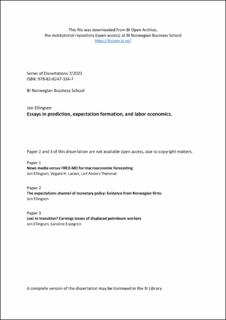| dc.description.abstract | News media versus FRED-MD for macroeconomic forecasting (Jon Ellingsen, Vegard Larsen, Leif Anders Thorsrud) Abstract: Using a unique dataset of 22.5 million news articles from the Dow Jones Newswires Archive, we perform an in depth real-time out-of-sample forecasting comparison study with one of the most widely used data sets in the newer forecasting literature, namely the FRED-MD dataset. Focusing on US GDP, consumption and investment growth, our results suggest that the news data contains information not captured by the hard economic indicators, and that the news-based data are particularly informative for forecasting consumption developments. The expectations channel of monetary policy: Evidence from Norwegian firms (Jon Ellingsen) Abstract: An important transmission channel of monetary policy is the expectations channel. However, although this channel is important in theory, it has received limited attention in the empirical literature. One reason for this lack of focus is the scarcity of data on firms’ expectations. This paper uses a novel data set on firms’ expectations and estimates how they respond to monetary policy announcements. I find that firms respond to unexpected changes in the current policy rate by revising downward expectations about price pressure, output and employment growth, and labor market tightness. However, following an unexpected tightening in the future path of monetary policy, firms revise upward expectations about output growth. While the first result is in line with the predictions of the New Keynesian model, the second provides support for the information effect of monetary policy. Lost in transition? Earnings losses of displaced petroleum workers (Jon Ellingsen, Caroline Espegren) Abstract: We estimate the earnings losses of displaced petroleum workers using a matched employer-employee longitudinal data set from Norway, coupled with an event-study framework of the oil price drop in 2014. Displacement leads to sizable and persistent earnings losses, and the magnitudes are particularly large for petroleum workers moving to other industries. More importantly, we document that almost 70 percent of the earnings losses can be attributed to lost industry-specific earnings premiums caused by workers moving from an industry characterized by large resource rents. In contrast, worker-industry match effects are negligible. | en_US |
